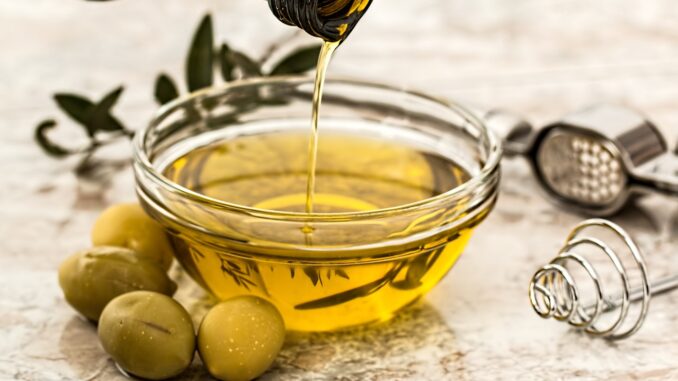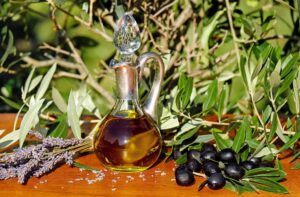
For those who have been diagnosed with fatty liver, it’s important to understand the benefits of olive oil and how it can help improve your health. Olive oil is becoming a popular choice for those with fatty liver because of its anti-inflammatory properties and ability to reduce fat accumulation in the liver. In this blog post, we will discuss the potential benefits of using olive oil for fatty liver, as well as tips on how you can incorporate it into your diet. We’ll also cover common questions about olive oil so that you can make an informed decision about your health and wellness.
What is Olive Oil and How is it Made?
Olive oil is a type of vegetable oil that is extracted from olives, the fruits of the olive tree. It is a staple in many Mediterranean countries and has a long history of use in cooking and as a medicinal agent.

There are different types of olive oil, depending on how it is processed. Virgin olive oil is made from the first cold pressing of olives and has higher acidity than other types. Extra-virgin olive oil is made from the second cold pressing and has even lower acidity. Refined olive oil is made from heat-treated virgin olive oils and has a milder flavor.
Olive oil contains monounsaturated fats, which are considered to be healthy. It also contains antioxidants and vitamins A, E, and K.
Extra virgin olive oil is loaded with antioxidants and healthy monounsaturated fats that can have profound effects on your health.
Studies show that olive oil can improve several risk factors for heart disease, including reducing LDL (bad) cholesterol and blood pressure while increasing HDL (good) cholesterol (1).
Olive oil may also help protect against Alzheimer’s disease and cancer.
What’s more, this healthy fat can help you lose weight. Despite being high in calories, monounsaturated fats like olive oil are more likely to be used as energy than stored as fat.
So, if you’re looking to improve your overall health or lose weight, olive oil is a great place to start.
What is Fatty Liver Disease?
Fatty liver disease is a condition in which fat accumulates in the liver. This can be due to several reasons, including obesity, drinking too much alcohol, or having diabetes. Fatty liver disease can lead to inflammation of the liver and, eventually, cirrhosis (scarring of the liver). Although there is no cure for fatty liver disease, making lifestyle changes, such as losing weight and cutting back on alcohol consumption, can help to slow its progression.
The Role of Diet in Fatty Liver Disease
A healthy diet is important for maintaining a healthy liver, and certain foods can help to protect the liver from fatty liver disease. These include olive oil, which is rich in antioxidants and can help to reduce inflammation; fish oils, which are high in omega-3 fatty acids and can help to protect the liver from damage; and fruits and vegetables, which are packed with nutrients and antioxidants that can help to keep the liver healthy.
The Nutritional Composition of Olive Oil
It is a common misconception that all fats are bad for you. In reality, there are good fats and bad fats. The type of fat found in olive oil is a good fat called monounsaturated fat. This type of fat can help to improve your cholesterol levels and reduce your risk of heart disease (2).
When it comes to fatty liver, olive oil can be protective. A fatty liver occurs when there is an accumulation of fat in the liver cells. This can be due to excess calories, alcohol consumption, or certain medications. A fatty liver can lead to inflammation, scarring, and eventually cirrhosis (scarring of the liver).
Studies have shown that olive oil can help to reduce the amount of fat in the liver and improve liver function (3). One study showed that people with non-alcoholic fatty liver who consumed olive oil for 8 weeks had a significant decrease in their liver fat content and improved liver function tests (4).
So, if you have fatty liver disease, adding olive oil to your diet may help improve your condition. Just remember to consume it in moderation as part of a healthy diet.
The Relationship Between Olive Oil and Fatty Liver Disease
Olive oil is protective against fatty liver disease. In a recent study, people who consumed the most olive oil had a significantly lower risk of developing fatty liver disease than those who consumed the least.
The exact mechanisms by which olive oil protects against fatty liver disease are not fully understood, but it is thought that the anti-inflammatory and antioxidant properties of olive oil may play a role. Additionally, olive oil has been shown to improve insulin sensitivity, which is thought to help protect against the development of fatty liver disease.
Research on the Benefits of Olive Oil for Fatty Liver Disease
Several studies have shown that olive oil can help to reduce the amount of fat in the liver, and this can be especially helpful for those with fatty liver disease (5). In one study, people with fatty liver disease who were given a daily supplement of olive oil for eight weeks had a significant reduction in the amount of fat in their liver, as well as improved liver function (6).
Another study found that people with non-alcoholic fatty liver disease who consumed olive oil for six months had a significant reduction in liver fat, as well as improvements in blood sugar control and LDL cholesterol levels (7).
So, if you’re looking for a natural way to help improve your fatty liver disease, consider adding some olive oil to your diet.

How to Incorporate Olive Oil into Your Diet
If you’re looking to improve your liver health, one simple change you can make is to incorporate olive oil into your diet. Here are a few ways to do so:
- Add olive oil to salad dressings or use it as a dip for bread.
- Use olive oil when cooking vegetables, pasta, or protein.
- Make a healthy olive oil vinaigrette by mixing olive oil with vinegar and spices.
- Drizzle olive oil over finished dishes like soup or pizza.
Other Lifestyle Changes That May Help Improve Fatty Liver Disease
In addition to a healthy diet, other lifestyle changes can help improve fatty liver disease. These include:
- Exercise: Exercise helps to promote weight loss and improve insulin sensitivity. It also helps to reduce inflammation throughout the body, including in the liver.
- Weight loss: Losing weight can help to improve fatty liver disease by reducing the amount of fat stored in the liver and improving insulin sensitivity.
- Quit smoking: Smoking cigarettes increases the risk of developing fatty liver disease. Quitting smoking can help to reduce this risk.
- Limit alcohol consumption: Alcohol consumption can contribute to fatty liver disease. limiting alcohol intake can help to reduce the severity of the disease.
The Drawbacks of Olive Oil
Consuming moderate amounts of olive oil is generally considered safe and does not have any significant side effects for people with fatty liver disease.
However, it’s important to note that consuming excessive amounts of any type of oil, including olive oil, can lead to weight gain and potentially worsen fatty liver disease. Additionally, some people may be allergic to olive oil or experience digestive issues such as diarrhea, nausea, or bloating if they consume too much of it.
Therefore, it’s recommended to consume olive oil in moderation as part of a balanced diet and to consult with a healthcare provider or a registered dietitian before making any significant dietary changes, especially if you have a medical condition such as fatty liver disease.
Conclusion: Should You Use Olive Oil for Fatty Liver Disease?
A fatty liver diet should consist of whole, unprocessed foods like olive oil.
While there is no cure for fatty liver disease, making dietary changes can help to improve liver function and fat metabolism.
Olive oil is a good choice for a fatty liver diet as it is rich in healthy fats and antioxidants. It can help to reduce inflammation and improve liver function.
If you have fatty liver disease, talk to your doctor before making any dietary changes. They can help you create a plan that is right for you.
Article Studies, References, and Resources
- Olive oil may lower heart disease risk By American Heart Association News
https://www.heart.org/en/news/2020/03/05/olive-oil-may-lower-heart-disease-risk - Monounsaturated fatty acids, olive oil and health status: a systematic review and meta-analysis of cohort studies by Lukas Schwingshackl https://www.ncbi.nlm.nih.gov/pmc/articles/PMC4198773/
- Olive oil consumption and non-alcoholic fatty liver disease By Nimer Assy https://www.ncbi.nlm.nih.gov/pmc/articles/PMC2670406/
- Liver Protective Effects of Extra Virgin Olive Oil: Interaction between Its Chemical Composition and the Cell-signaling Pathways Involved in Protection By Sandra A Soto-Alarcon – https://pubmed.ncbi.nlm.nih.gov/29141573/
- Olive oil compound found to reverse the damage of high-fat diet By Ana Sandoiu https://www.medicalnewstoday.com/articles/316851
- Omega-3 supplementation and non-alcoholic fatty liver disease: a systematic review and meta-analysis by Helen M Parker https://pubmed.ncbi.nlm.nih.gov/22023985/
- Extra virgin olive oil use is associated with improved post-prandial blood glucose and LDL cholesterol in healthy subjects by F Violi
https://pubmed.ncbi.nlm.nih.gov/26192450/


Undeniably consider that which you said. Your favorite
justification seemed to be at the web the simplest factor to remember of.
I say to you, I certainly get annoyed while folks think about issues that they just
do not realize about. You managed to hit the nail upon the highest and outlined out
the whole thing with no need side-effects , people could take a signal.
Will probably be back to get more. Thanks
I relish, cause I found just what I was looking for.
You have ended my four day long hunt! God Bless you man. Have a nice day.
Bye
Usually I do not read article on blogs however I would like to say that this writeup very compelled me to take a look at and do it Your writing style has been amazed me Thank you very nice article